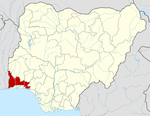Egun | |
|---|---|
| Total population | |
| 811.000 | |
| Regions with significant populations | |
| Nigeria, Benin | |
| Languages | |
| Gun, French | |
| Religion | |
| Christianity, Islam, Vodun[citation needed] | |
| Related ethnic groups | |
| Pha Phlera, Yoruba, Fon, Ewe , Adja |
The Gun people, also rendered Ogũ, Ogun and Egun, is an ethnic group principally found in Lagos and Ogun State regions of southwestern Nigeria, and Ouémé Department in the southeast of the Republic of Benin, who speak the Gun language. The Ogu account for about 15% of the indigenous population of Lagos State[1] and 6% of the total population of the Republic of Benin.
Origin
The Ogu are Gbe speaking people who were settlers in the old Dahomey presently known as Republic of Benin. Oral history has it that the Ogu people are a descendant of those who migrated from Whydah, Allada and Weme which are now part of the Republic of Benin as a result of the Dahomean War that occurred during the 18th century. According to Mesawaku, a historian; the Ogu people migrated to Badagry as early as the 15th century due to the need for security.[2]

Geography and people
The Ogu people are found in Badagry and in the Yewa and Ipokia region of Ogun State and Makoko in the Lagos. They are also located in some parts of the Republic of Benin. Since their environment is surrounded by water, majority of Ogu people are into fishing, coconut processing and salt production while some are involved in trading and farming.[3] The people of Ogu strongly believe in their traditions despite most of them being followers of other religions, they are seen worshipping a deity called Zangbeto.[4](A Nightman) .
The Ogu people share similarities with other Gbe people and Yorubas owing to the fact that during the 17-18th the Dahomey Empire was under the Oyo Empire rule, thus the strengthen relationship between both ethnicities.[citation needed]
Bibliography
- J. A. Fiberesima (1990). Okrika: In Search of an Ancestry. Evans Brothers. ISBN 978-978-167-450-1.
- A. Babatunde Olaide-Mesewaku; Babatunde A. Olaide-Mesewaku (2001). Badagry district, 1863-1999. John West Publications Ltd. ISBN 978-978-163-090-3.
- Akinjide Osuntokun (1987). History of the Peoples of Lagos State. Lantern Books. ISBN 978-978-2281-48-7.
References
- ^ Segun Olatunji (27 December 2013). "Egun people blame underdevelopment on minority status". The Punch. Retrieved 13 August 2015.
- ^ Anthonia Duru (2 August 2015). "Ogu: A people United By Tradition". Daily Independent. Archived from the original on 17 November 2015. Retrieved 13 August 2015.
- ^ Steven L. Danver (10 March 2015). Native Peoples of the World: An Encyclopedia of Groups, Cultures and Contemporary Issues. Routledge. pp. 19–. ISBN 978-1-317-46400-6.
- ^ Deolu (27 October 2012). "REVEALED: The Town Where Men Don't Use Condóm In Lagos". Information Nigeria. Retrieved 13 August 2015.

